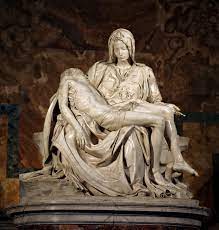On this day when the Church traditionally commemorates the sorrows of the Blessed Virgin Mary in connection with the sufferings of her Son, I am reminded - in the wake of the recent tragedy in Tennessee and repeated incidents of gun-violence in schools throughout our country - of theologian Elizabeth Johnson's observation in Truly Our Sister: a Theology of Mary in the Communion of Saints (Continuum, 2003). Mary, Johnson wrote, "joined the desolate cadre of women through the centuries who experience the terrible human condition of outliving one's child. There is no speaking this racking sorrow. It is out of the natural order of things. Worse yet, this death itself did not occur in the natural order of things but was violently inflicted ... One never really gets over the pain when someone you love is a victim of violence" [pp. 295-296].
Contrast that engaged appreciation of the pain of parents whose children's lives have been prematurely and violently destroyed with the stupid and unconscionably insensitive comments of Republican politicians, for example, TN Representative Tim Burchett's bizarre observation: “We’re not gonna fix it,” he explained, “criminals are gonna be criminals.” He's right, of course, that they aren't going to fix this appalling problem, but not because “criminals are gonna be criminals,” but because of Republican politicians' fetishistic identification with guns.
After all this time, there is really nothing new to be said about Republicans' malignant fetish for guns. In my 10 years in Tennessee, there was much in the local culture which I came to appreciate. But I have never ceased to be horrified and appalled by the prevailing tolerance for - and even celebration of - guns. This includes the bizarre notion some have that they need to own guns for their own protection, which is, of course, a complete negation of the very idea of society, which is that we are no longer isolated individuals left to fend for ourselves on a Hobbesian "war of all against all." Of course, when Thomas Hobbes created his "state of nature," his purpose was not to celebrate the "war of all against all," as our crazy American gun culture does, but to warn against it and to celebrate the alternative of civil society.
That civil society has a real responsibility to serve its citizens, which in this instance means taking effective action against the leading cause of death among American children, which (believe it or not) is not "Drag Queen Story Hour."
As often happens after these kinds of incidents, some prefer to focus on the attacker and his or her motives. In this case, there is a fevered effort in some quarters to demonstrate that the attacker was motivated by "anti-Christian" sentiments. Perhaps. Or perhaps the attacker had other reasons to dislike the school, had bad memories from attending the school that were not explicitly religious. At present, we do not really know. Obviously, these are not uninteresting questions. (And, of course, if the attacker were alive and going to trial, motivation might be a much more relevant issue.)
But, when all is said and done, it remains the case that, whatever the attacker's attitudes and motivations, it was access to guns that made the attack possible. If “criminals are gonna be criminals,” it is just as true that explicit anti-Semites (Pittsburgh synagogue) and explicit racists (Buffalo store, Charleston church) and explicit anti-Christians (if indeed that was the motivation in Nashville) “are gonna be” anti-Semites or racists or anti-Christians. But, in all those familiar cases, they would have been less likely to succeed, certainly less likely to do the degree of damage that they did, had they not had easy access to guns. It may be, as some hypocritically like to allege, that "guns don't kill, people do." But the fact is that people with guns kill. People without guns kill a lot less.
American gun-culture fetishism is one expression of American exceptionalism which we have all too much of and which we would be much better off doing without!













